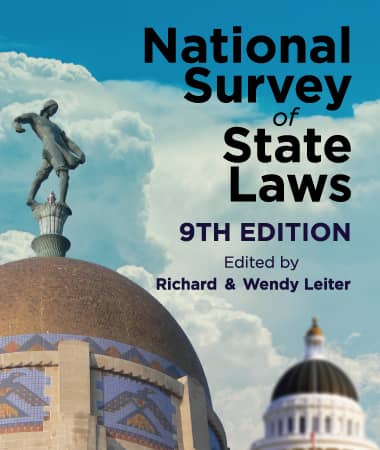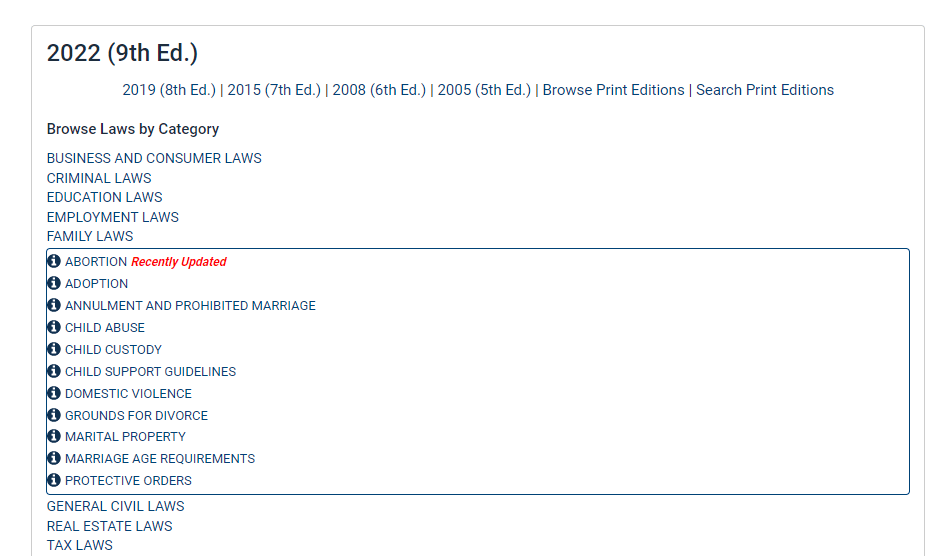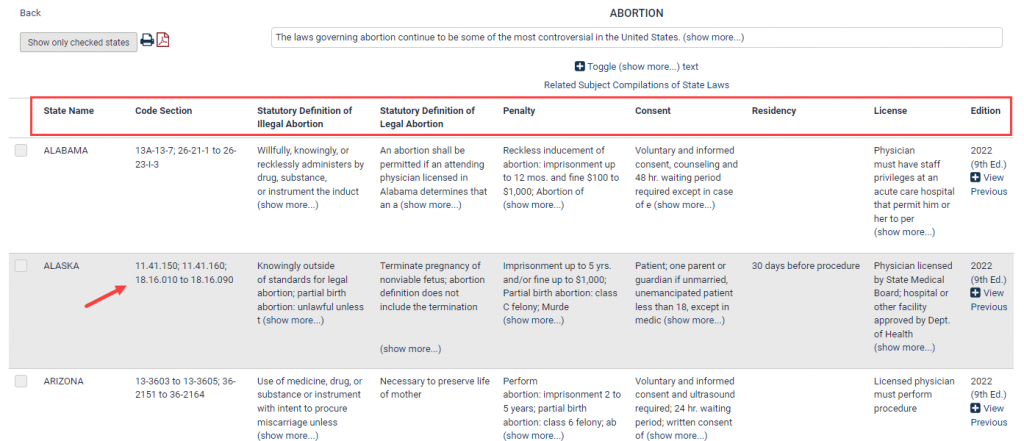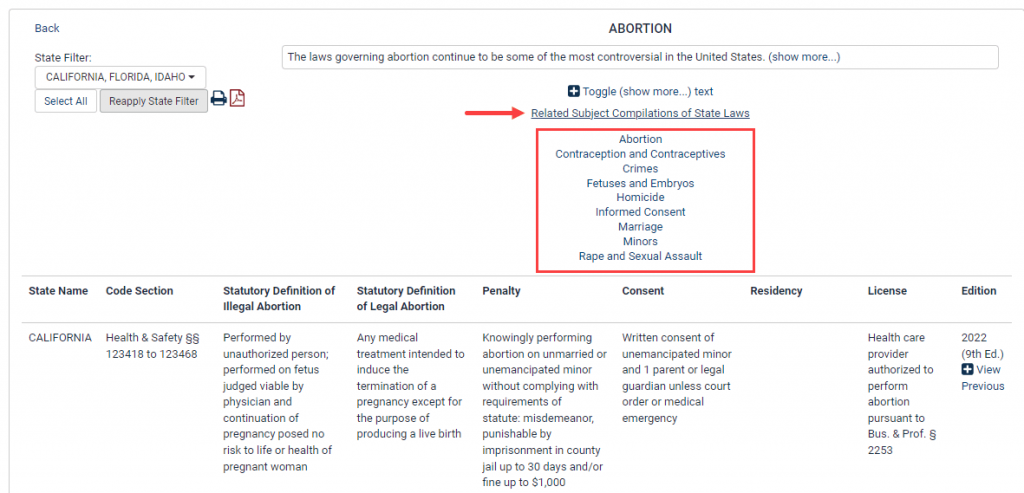We’re excited to announce the release of the new edition of National Survey of State Laws! The 9th edition includes an additional 120 pages and three years of updates for every chapter. It also has four new chapters. Watch this short video or continue reading to learn more about National Survey of State Laws.
Print and Online Resource
A MUST-HAVE GUIDE FOR STATE-BY-STATE LAW COMPARISON
National Survey of State Laws (NSSL) is a print and online resource that provides an overall view of some of the most asked-about and controversial legal topics in the United States. The database is derived from Richard Leiter’s National Survey of State Laws print editions. Presented in an interactive chart format, NSSL allows users to make basic state-by-state comparisons of current state laws. The database is updated regularly as new laws are passed or updated.
The current 9th edition, along with the 8th, 7th, 6th, and 5th editions, are available in HeinOnline’s image-based, fully searchable, user-friendly database format. Users can use the database to compare the same laws as they existed in 2005, 2008, 2015, 2018, and 2019 and to make more current comparisons with laws added or updated in the database since 2019.

While the print version of the 9th edition is in the midst of being published, the database version reflects the most current law, so users can stay up to date with trending topics such as:
Award-Winning
Previous editions of NSSL have won a number of awards:
- Joseph L. Andrews Bibliographical Award
- Named one of the New York Public Library’s Outstanding Reference Resources
- Named to the Wilson Library Quarterly’s Field Tested Reference Resource
Chapters New to the 9th Edition
The upcoming edition of National Survey of State Laws includes addition of a number of new chapters, including:
The number of breweries in the United States is increasing at a rapid rate, with 6,400 operating by the end of 2019. This chapter reflects the rights and responsibilities of brewers and other beer manufacturers. Unless necessary for clarity, it does not mention other business entities that sell beer, such as non-brewpub restaurants or grocery stores.
The question of privacy has long been a cornerstone of the American constitutional and democratic experiment. The matter of individual privacy has been intricately entangled with the right to freedom of conscience and speech, within limits. The question of the right of privacy and, specifically, who should have access to library records has divided libraries and their patrons. There are strong arguments on both sides.
The medical community has shared a questionable history with unclaimed bodies. Driven by a constant need for bodies for use in medical research and advancement, medical centers and universities historically have accepted the unclaimed bodies of marginalized people—including non-white, poor, mentally disabled, elderly, non-heterosexual, and incarcerated peoples. Because there is no uniform system in place in the United States to deal with unclaimed remains, each state has adopted its own protocol.
In the United States, the right to vote is viewed as essential to the fabric of our nation. Still, there are those who labor to disenfranchise, and much of that happens at the state level, where the mechanics of voting are centered. This chapter focuses on the state-by-state differences in voting laws, and particularly the volatile area of absentee voting.
All Other Available Chapters
- Abortion
- Adoption
- Adverse Possession
- Animal Welfare
- Annulment and Prohibited Marriage
- Antitrust
- Attorneys
- Bullying
- Capital Punishment
- Child Abuse
- Child Custody
- Child Support Guidelines
- Civil Rights
- Civil Shoplifting
- Civil Statutes of Limitations
- Compulsory Education
- Computer Crimes
- Consumer Taxes
- Corporal Punishment in Public Schools
- Criminal Statutes of Limitations
- Deceptive Trade Practices
- Domestic Violence
- Drunk Driving
- Food Laws
- Freedom of Information Acts
- Gambling
- Grounds for Divorce
- Gun Control
- Helmet and Selected Safety Laws for Motorcyclists and Bicyclists
- Homestead
- Illegal Drugs: Cocaine
- Illegal Drugs: Heroin
- Interest Rates
- Leases and Rental Agreements
- Legal Ages
- Legal Holidays
- Lemon Laws
- Lost, Abandoned, and Unclaimed Personal Property
- Marijuana Laws
- Marital Property
- Marriage Age Requirements
- Medical Records
- Minimum Wage
- Negligence
- Personal Income Tax
- Prayer in Public Schools
- Privacy of School Records
- Prohibited Consensual Sexual Activity
- Protective Orders
- Restrictive Covenants in Employment
- Right to Die: Durable Power of Attorney
- Right to Die: Euthanasia
- Right to Die: Living Wills
- Right to Work
- Seat Belt Laws
- Stalking
- State Lotteries
- Theft of Identity
- Whistleblower
- Statutes Wills
Using the Database
From the database homepage, users have the option to browse or search within the print editions. The topics featured in National Survey of State Laws fall into the following categories:
- Business and Consumer Laws
- Criminal Laws
- Education Laws
- Employment Laws
- Family Laws
- General Civil Laws
- Real Estate Laws
- Tax Laws

Select any categories to view a list of topics. Once a topic is selected, users are brought to an interactive chart. The top column includes important points for each law. Beneath, brief statements provide the core points of each state statute. References to state statutes and code sections are provided to help users further their research.

From the chart users can compare the law across specific states. Check the boxes next to each preferred state and select “Show only checked states.” This provides a new chart showing only the selected states. Users can also view the law as it appeared in previous editions of this title by selecting View Previous editions.
View and seamlessly link related Subject Compilations of State Law* subjects, an award-winning resource that identifies and describes 50 state law surveys on hundreds of subjects in hundreds of sources.

*Customers must subscribe to this database in order to access these links.
About the Editor
Richard Leiter is the Director of the Schmid Law Library and Professor of Law at Nebraska College of Law. He got his start in law libraries in 1977 at Irell & Manella, a prominent Los Angeles law firm. After graduating from Southwestern University Law School in 1981, he moved to Texas where he worked at the University of Texas Tarlton Law Library and earned his Masters in Library and Information Science in 1985. Over time, he became the head of public services at the University of Nebraska, managed the library at Littler Mendelson Fastiff & Tichy in San Francisco, and managed academic law libraries at Regent University and Howard University before returning to Lincoln in 2000. Professor Leiter has written widely on law library, legal research, and legal information technology issues. He is an active scholar and has contributed to books, the Law Library Journal, and numerous other law library publications.

Pricing
Print & Online Access:
Pre-order the 9th Edition and receive immediate access to the online database. The print book will be shipped in the upcoming weeks. This one-time purchase provides access until the next edition is published.
1 Print Copy & Online Access for 1 Location…………………………………..………..….…..$265.00*
Additional Print Copies………………………………………………………………………….…..…………$105.00
*The price above does not include shipping and handling.



